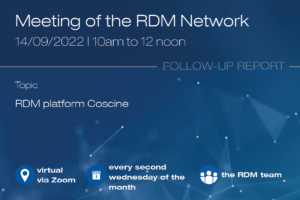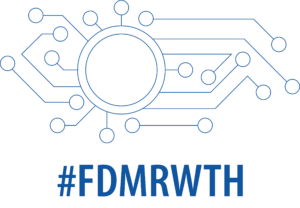
Source: Own illustration; Freepik
The wait has come to an end and the monthly RDM network meeting is back! After the summer break, data stewards, RDM managers and RDM interested parties from RWTH Aachen University came together again online via Zoom on September 14, 2022. This time, the participants learned about the RDM platform Coscine developed at RWTH and its functions.
Presentation of the research data management platform Coscine
The service manager of Coscine Dr. Ilona Lang introduced the Research Data Management platform in the first part of the meeting.
Behind the development of Coscine is the motivation to integrate FAIR principles into the everyday handling of research data. Usually, only part of the collected research data is put into a FAIR context after completion of the respective project in the context of a publication. All other collected data is thus lost for efficient subsequent use. The platform is intended to counteract this and create an appropriate data management environment for the entire research process.
Currently, Coscine is still in the pilot phase. In this phase, it is mainly used by institutes of RWTH Aachen University and the Collaborative Research Centers (SFB). The University of Duisburg-Essen, the TU Dortmund and various universities of applied sciences in NRW are currently in the onboarding phase. Technically, Coscine is also being continuously developed and optimized. GitLab is soon to be integrated into the platform. Likewise, the integration of services such as NextCloud and Sciebo is planned for the future.
During the presentation, the participants were able to get to know the user interface and the functions of the platform better by means of a demonstration.
Creating application profiles in Coscine
The second part of the meeting went even deeper into the subject. Here, data steward Nicole Parks showed the participants how to build application profiles in Coscine with the corresponding generator from AIMS, using a use case from SFB 985. The big advantage: the individual application profiles are automatically formulated in SHACL and translated into RDF data format. Thus, even without in-depth knowledge of SHACL and RDF data format, users have the possibility to define the structure of their metadata and at the same time make the data interoperable and machine-readable – in line with the FAIR principles.
The speakers in a hail of questions
After the presentations, the participants showed great interest in the platform and asked the speakers many questions. Among other things, they asked about the security of the data, migration support, the procedure with large amounts of data, file formats and the search function of the platform.
Coscine through the FAIR lens
In the last part of the session, Coscine was scrutinised in the context of the FAIR principles and the benefits of the platform were discussed. The special feature of Coscine is the integrated handling of metadata. These are automatically linked to the research data and can be shared publicly. Furthermore, they are represented by the established standards RDF and SHACL. The metadata should thus be made findable and interoperable. With the help of the application profile generator, discipline-specific metadata can also be combined without technical know-how.
The data will be stored in the research data repository for at least 10 years. For this period, sharing and access to the data is guaranteed, facilitating its reusability. The possible interaction paths via browser, REST API and S3 also increase not only the discoverability but also the accessibility of the research data.
The general hope of the participants is that the data will be better maintained and structured in a standardised way from the beginning, so that subsequent processes will also be facilitated.
The next network meeting – Save the Date
Date: October 12, 2022
Time: 10am to 12 noon
Location: Zoom – Registration
Topic: FAIR metrics
Learn more
For more information on Coscine, please see the website and documentation. If you want to stay up to date, you should sign up for the Coscine mailing list.
If you also want to become a part of the RDM network at RWTH, then subscribe to the mailing list “DataStewards@RWTH”.
If you have any questions about the RDM network or RDM in general, just write a message to the IT-ServiceDesk. The RDM team looks forward to hearing from you.
_______
Responsible for the content of this article is Lina-Louise Kaulbach and Sophia Nosthoff.





Leave a Reply
You must be logged in to post a comment.